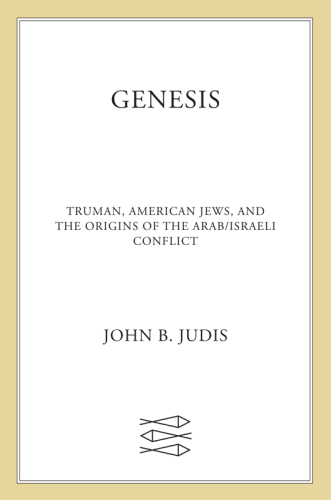
Genesis
Truman, American Jews, and the Origins of the Arab/Israeli Conflict
کتاب های مرتبط
- اطلاعات
- نقد و بررسی
- دیدگاه کاربران
نقد و بررسی

November 25, 2013
Judis (The Folly of Empire), senior editor at the New Republic, examines the important turning points that led to the establishment and administration of a Jewish homeland in Palestine, with a focus on President Truman's failure "to resolve the conflict between Zionism and Arab nationalism." From the 1880s through the wars of 1948, Judis provides detailed accounts of behind-the-scenes maneuvering by international players and politicians. He shows that the American Zionist movement, by involving the U.S. government in the Palestine question, made it much more difficult for the Zionists and Arabs to resolve the issue peacefully. And once they achieved statehood, the Israelis themselves were just as uncompromising as the Zionists had been in their clashes with the Arabs. Judis forcefully argues for broader recognition of the fact that the rights of Palestinian Arabs have long been denied and shows how the historical rationalizations employed to deny such rights are devoid of substance. One minor qualm is that, given the conflict's complexity and the myriad individuals and organizations involved, it would have been helpful to include a timeline of events and a section with short biographical notes on the key players. Nevertheless, Judis succeeds admirably in taking a deeply divisive and multifaceted issue and explaining it in an accessible way.

December 1, 2013
Dogged, exhaustive survey of the rocky road from late-19th-century Zionism through President Harry Truman's recognition of the state of Israel. By the time New Republic senior editor Judis (The Folly of Empire: What George W. Bush Could Learn from Theodore Roosevelt and Woodrow Wilson, 2004, etc.) arrives at Truman's travails over how to handle Jewish-Arab Palestine at the end of World War II, the author has already slogged through the complicated history of Zionism in late-19th-century Europe. He depicts Palestine both as a refuge from anti-Semitism, as envisioned by Theodor Herzl, and as a "spiritual center" coexistent with non-Jewish inhabitants as envisioned by Ahad Ha'am and the Lovers of Zion. Yet the "holy land" was not a place of "desolation" as per the mythmaking of the Western imagination. Rather, it was inhabited by hundreds of thousands of constantly feuding Muslims and Christians who lacked the political organization or money of the evolving Jewish Agency for Israel. The intransigence of both sides, Jew and Arab, is astounding, especially in the course of the early history, when there were actually moments when a binational solution might have been possible. The Balfour Declaration's support for a "national home for the Jewish people" without affording the "non-Jewish communities in Palestine" any political rights furnished the validation that the Zionists needed for boosting Jewish immigration, purchasing choice agricultural land from the Arabs and rejecting Arab labor, all of which tipped the balance of power in the region. Moralist Truman's hesitations about a Jewish state at the expense of the Arabs were overridden by the American Zionist lobby, led by the combative Rabbi Abba Hillel Silver of the American Zionist Emergency Council. As Judis painstakingly delineates, Truman's continually "passing the buck" allowed the Arab-Israeli War to inevitably unfurl. A valiant, detailed effort to establish some clarity around the murky historical underpinnings of the Arab/Israeli conflict.
COPYRIGHT(2013) Kirkus Reviews, ALL RIGHTS RESERVED.

























دیدگاه کاربران